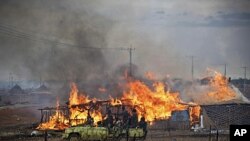Amnesty International says United Nations peacekeepers failed to protect civilians during fighting this year in the disputed Abyei region between Sudan and South Sudan. The rights group is calling for the new U.N. peacekeeping force currently deploying to the area to do a better job.
In May of this year, Sudanese armed forces and allied militias stormed Abyei, set homes on fire, looted stores and forced anybody healthy enough, to flee for their lives. More than 100,000 people were displaced.
All of this violence is reported to have place in the presence of a U.N. peacekeeping force called UNMIS.
“They did nothing, for whatever reason. Whether it was because they had a lack of staff or insufficient equipment, you know, we don't know. But what is clear is that they allowed that to happen -- the entire population of Abyei to be driven out,” Amnesty International Senior Crisis Response Advisor Donatella Rovera said.
In a new report, Amnesty alleges that UNMIS failed in its mandate to protect the civilian populations of Abyei. Citing former UNMIS staff, the report says, in the days after the Sudanese forces overran the area, “UNMIS could only undertake limited patrols under Sudan military escort and without leaving the vehicles.”
Officials from the former peacekeeping force could not be reached for comment.
A new U.N. peacekeeping force is deploying to Abyei. Known as UNIFSA, the mission has a similar mandate, instructed to use “all necessary means” to protect civilians threatened by violence. At full strength, the force will employ 4,200 peacekeepers.
Rovera says Amnesty hopes UNIFSA will be more successful than its predecessor for the sake of those displaced by fighting. “People are desperate to go back to Abyei to rebuild their lives. For that to happen, they need some security. And that's why we're calling on the U.N., whose peacekeepers are there, to step up efforts to provide the security that the civilian population will need to go back,” she stated.
Rovera and other Amnesty officials recently visited the camps where Abyei's former residents are living. The group says some people have started to go back to Abyei to check on conditions there, but that most do not feel it is safe enough to return permanently.
Reports that land mines having been planted there, both by Sudanese and Southern Sudanese allied forces, pose another serious concern.
The dispute about Abyei, claimed by both Sudans, is one of the major unresolved issues between the two nations, following the South's declaration of independence, earlier this year.




